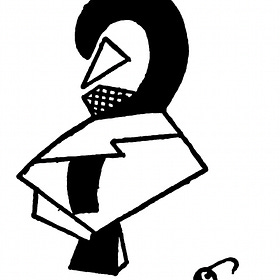Colors & Life (1927)
Colors Blacks, browns, Tans and yellows; Like flowers We're a race Of numerous colors. Life Birth, Love, Sickness, Then death. We toil for tomorrow; Leave our loved ones in sorrow.
Perry, Edward (p. 1927, etc.)
P: The Messenger (1927), etc.
Broadway dancer, actor, artist, and poet. Likely in a relationship with poet and anthologist Countee Cullen for a time; “Edward, May these poor rhymes when read by you borrow light from the greater glory of that perfect poem which is our friendship. Sincerely, Countee.” (inscribed in a Perry's copy of Cullens' book Color, 1925) Cullen also dedicated the poem 'More Than A Fool's Song' (from Copper Sun, 1927) to Perry.
Another Pride Month Special! There are very few references to Perry outside of his relationship with Cullen, and none to his poetry, though I did find the following announcement: “The first independent exhibition of the work of a group of young Negro artists was presented by Wallace Thurman in New York from April 6 through April 10. The exhibit included portraits, sculpture, drawings and batiks by the following artists: Aaron Douglas, Richard Reid, Clifton Hill, Leon Noyes, Edward Perry, William Songers, Eife Mason, Richard Bruce, Gray Johnson, Richard Good.” (Opportunity, 1927)
More Than A Fool's Song (To Edward Perry) Countee Cullen Go look for beauty where you least Expect to hear her hive; Regale your belly with a feast Of hunger till you thrive. For honest treatment seek the thief; For truth consult the liar; Court pleasure in the halls of grief; Find smoothness on a briar. The worth impearled in chastity Is known best of the harlot, And courage throws her panoply On many a native varlet. In Christian practice those who move By symbols strange to us May reckon clearer of His love Than we who own His cross. The world's a curious riddle thrown Water-wise from heaven's cup; The souls we think are hurtling down Perhaps are climbing up.
Forgotten Poets Presents:
Forgotten Poems, a living anthology of obscure and out-of-print poetry from the late-1800s and early-1900s. Explore the archives:
Hart Crane - My Grandmother's Love Letters (1926)
—: My Grandmother’s Love Letters :— There are no stars to-night But those of memory. Yet how much room for memory there is In the loose girdle of soft rain. There is even room enough...
More African American poetry . . .
Alfred R. Bailey - Tomorrow (1925)
—: Tomorrow :— Yesterday is gone. Tomorrow comes— Tomorrow, with its hopes, its cares. The opportunities I lost in yesterday Will urge my slow ambition...
Edward Storer - 7 Short Poems (1907-22)
—: Fragment :— And you shall be A poet, and shall come Nearest of all To reading what May ne’er be read...












Both beautiful poems. The second got my attention more because I was thinking the last line, is the longest, and it reflects how we accumulate experiences and it's at the highest point at the end of one's life. So few words, so much meaning. The first had a sound to it that connects as you read it loud.
I enjoyed these poems, but more so the longest one. Under the seemingly contradictory verses lies some truth. Good work!